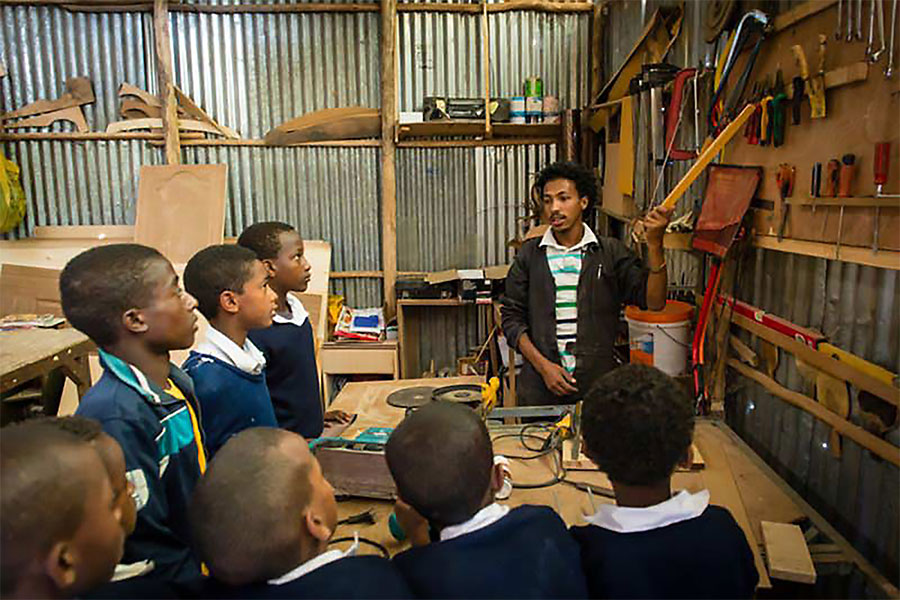
Commentaries | Jan 26,2019
Nov 21 , 2018
By Nomathemba Mhlanga , Divine Njie
As Africa’s population continues to increase and environmental degradation takes its toll, meeting the food and nutritional demands of the continent will be hard. To address this, governments ought to put in place policies to make agriculture attractive to the youth, write Nomathemba Mhlanga, an agribusiness officer of FAO’s Sub-regional Office for Eastern Africa, and Divine Njie, deputy strategic programme leader of the Food Systems Programme (SP4) at FAO.
Over the past half decade, Africa’s agriculture has shown impressive growth. In 2014, the agricultural sector grew at a rate of around five percent, almost double the global average. Despite this progress, Africa has remained a net importer of food and non-food agricultural products.
Progress toward improved food security has been also slowed down to the extent of leaving over 23pc of the continent’s population undernourished. Currently, Africa is not able to generate enough food for its growing population. The 2018 Global Report on Food Crises indicates that the number of food insecure people in 2017 has reached almost 124 million, two-thirds of which were in Africa.
These challenges are attributed to conflicts, harsh climatic conditions and population pressures. In recent times, rapid urbanisation, with a huge influx of youth population to towns, has further jeopardised this situation.
Africa has the youngest population in the world, with almost 200 million people aged between 15 and 24. Around half of the population is estimated to be under 25 years old. Although Africa is the least urbanised region of the world, with an urban population of 39pc, it has the fastest urban growth rate of 4.5pc because of this emerging youth population. Half of Africa’s population will be living in urban areas by 2035, according to the projections of the United Nations.
In the same token, the natural resources, biodiversity and ecosystems upon which the continent’s agriculture is reliant are being unsustainably exploited and degraded, while climate change poses a significant challenge to the crop, livestock, fisheries and forestry sectors.
This analysis indicates that African countries can hardly achieve a significant turnaround and feed their citizens and create adequate jobs for the youth unless their agriculture is modernised through appropriate mechanisation and agribusiness strategies.
Regrettably, agricultural mechanisation and agribusiness development in Africa are lagging significantly behind other developing regions. In sub-Saharan Africa, 80pc of farm activity is still being done by smallholders and is characterised by mostly small to medium scale family-led farms that rely almost entirely on manual labour.
It is estimated that over 60pc of agricultural power is still provided by human power, mostly by women, the elderly and children. Where animals are used, about a quarter of farm power is provided by animal traction, while only 20pc of mechanisation is provided by engine power.
When it comes to agribusiness, despite the growing international demand for higher-value processed products, Africa is yet to make significant progress toward adding value to its primary agricultural commodities.
Some estimates show that African countries contribute less than 10pc to global value addition, while Africa’s international trade is dominated by primary commodity exports that represent almost 60pc of total export value.
The low levels of mechanisation and value addition make agriculture unattractive to Africa’s youth while also limiting opportunities for income generation and employment. As such, they are some of the contributory factors to out-migration, particularly of youth, from rural areas in search of alternative livelihoods and opportunities in urban areas and foreign countries.
As many young Africans find traditional farming unattractive, the prospects are higher for involving them in profitable agro-enterprises and more modern, mechanised agri-food systems where they can apply their education, entrepreneurial potential, technological knowledge and innovation.
Mechanisation also spurs agribusiness development by generating demand for agricultural products, inputs and services, creating on and off-farm employment and enhancing incomes. There are numerous entry points for youth participation in modern and efficient value chains.
For instance, they can offer hiring services for sustainable agricultural mechanisation, venture into a variety of enterprises such as mushroom production, aquaculture, beekeeping, poultry, logistics and agro-processing.
What needs to be done to bring the turnaround?
If the youth are to play a role in enabling Africa to meet the future food and nutrition needs of its population, investments are needed to address the numerous constraints limiting the establishment and operation of agro-enterprises and the mechanisation of the agricultural and food systems on the continent. These constraints include unsupportive policy and regulatory environments, limited access to land, information, technologies and financial services, as well as inadequate skills development.
Comprehensive and robust national strategies are needed to pave the path to sustainable agricultural mechanisation and agribusiness. To help countries develop such strategies, the African Union Commission (AUC) and FAO [which both of the authors of this article are employees of] have developed a new strategic framework that identifies priorities to be considered by countries in the process of developing sustainable agricultural mechanisation strategies while avoiding the pitfalls of the earlier failed approaches.
An important area for youth is capacity development: equipping them with the skills and training they need to run their agro-enterprises or be employable. Fortunately, there are positive developments to build on.
FAO and AUC, in collaboration with the African Agribusiness Incubation Network (AAIN), have assessed selected agribusiness incubators in Ethiopia, Ghana, Kenya, Mali, Nigeria, Rwanda and Zambia with a view of preparing a capacity development programme.
In parallel, alternative capacity development approaches, such as the Junior Farmer Field & Life Schools (JFFLS), have been revisited to address the needs of rural youth who might not have the academic background to access incubators but are already engaged in or are interested in engaging in the agricultural sector.
A private agro-enterprise in Ethiopia opened a training centre to extend and strengthen after-sales support and services for mechanisation where rural youth are trained in operating, maintaining and repairing machinery.
Mechanisation and agribusiness development are important vehicles for making agriculture more dynamic, profitable, competitive and appealing for the youth. Facing the growing challenges of food insecurity, youth unemployment, urbanisation and migration, African governments need to formulate and systematically implement policies and programmes in agricultural mechanisation and agribusiness. This certainly requires a strong political will and adequate investment on their part.
PUBLISHED ON
Nov 21,2018 [ VOL
19 , NO
969]

Commentaries | Jan 26,2019

Radar | Aug 12,2023

Commentaries | Jun 19,2021

Sunday with Eden | Jul 02,2022

Radar | Jun 05,2021

Sunday with Eden | Oct 09,2021

View From Arada | May 29,2021

Radar | May 18,2019

Radar | Feb 26,2022

Agenda | May 14,2022

Photo Gallery | 177824 Views | May 06,2019

Photo Gallery | 168037 Views | Apr 26,2019

Photo Gallery | 158748 Views | Oct 06,2021

My Opinion | 137014 Views | Aug 14,2021
Commentaries | Oct 25,2025

Dec 22 , 2024 . By TIZITA SHEWAFERAW
Charged with transforming colossal state-owned enterprises into modern and competitiv...

Aug 18 , 2024 . By AKSAH ITALO
Although predictable Yonas Zerihun's job in the ride-hailing service is not immune to...

Jul 28 , 2024 . By TIZITA SHEWAFERAW
Unhabitual, perhaps too many, Samuel Gebreyohannes, 38, used to occasionally enjoy a couple of beers at breakfast. However, he recently swit...

Jul 13 , 2024 . By AKSAH ITALO
Investors who rely on tractors, trucks, and field vehicles for commuting, transporting commodities, and f...

Oct 25 , 2025
The regulatory machinery is on overdrive. In only two years, no fewer than 35 new pro...

Oct 18 , 2025
The political establishment, notably the ruling party and its top brass, has become p...

Oct 11 , 2025
Ladislas Farago, a roving Associated Press (AP) correspondent, arrived in Ethiopia in...

Oct 4 , 2025
Eyob Tekalegn (PhD) had been in the Governor's chair for only weeks when, on Septembe...

Oct 25 , 2025 . By YITBAREK GETACHEW
Officials of the Addis Abeba's Education Bureau have embarked on an ambitious experim...

Oct 26 , 2025 . By YITBAREK GETACHEW
The federal government is making a landmark shift in its investment incentive regime...

Oct 27 , 2025
The National Bank of Ethiopia (NBE) is preparing to issue a directive that will funda...

Oct 26 , 2025 . By SURAFEL MULUGETA
A community of booksellers shadowing the Ethiopian National Theatre has been jolted b...